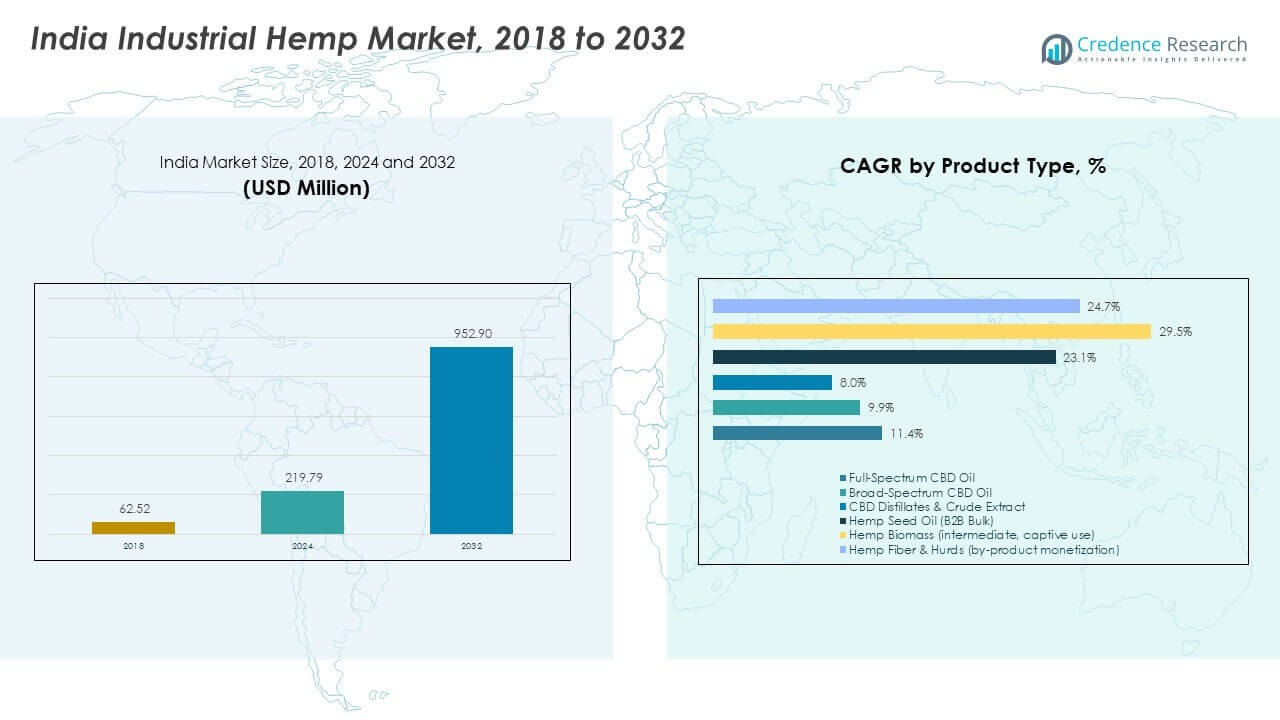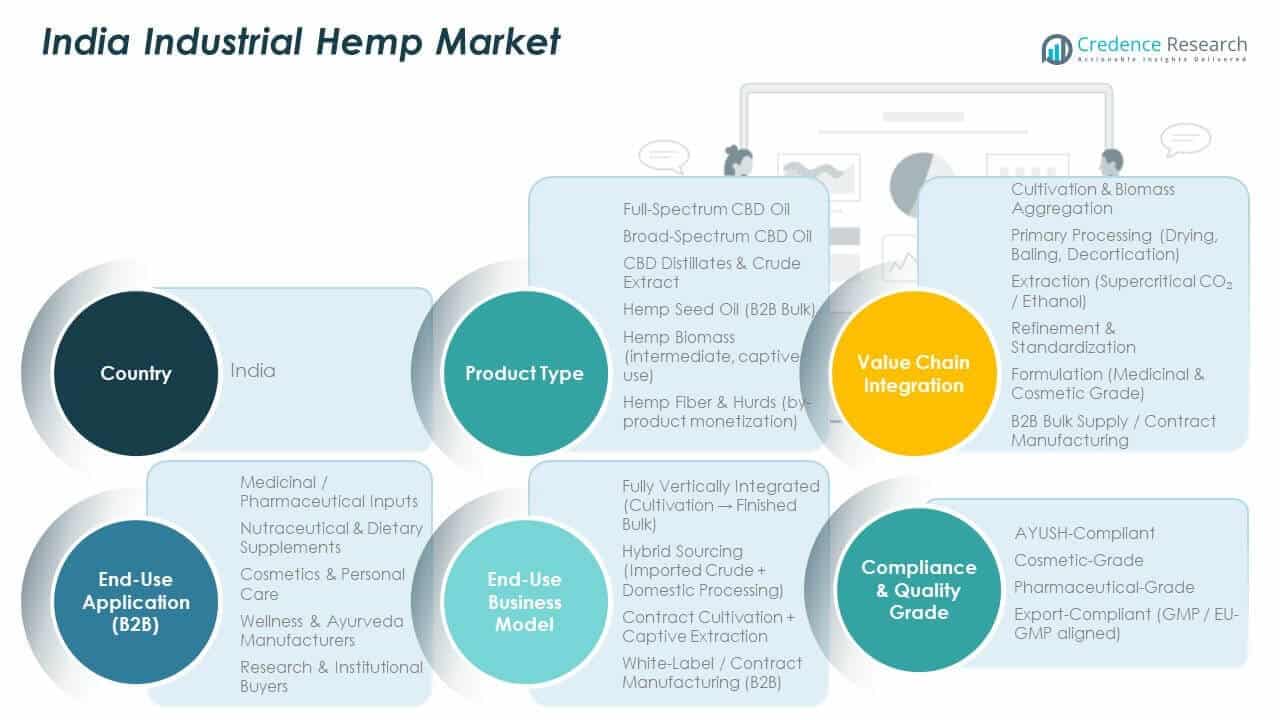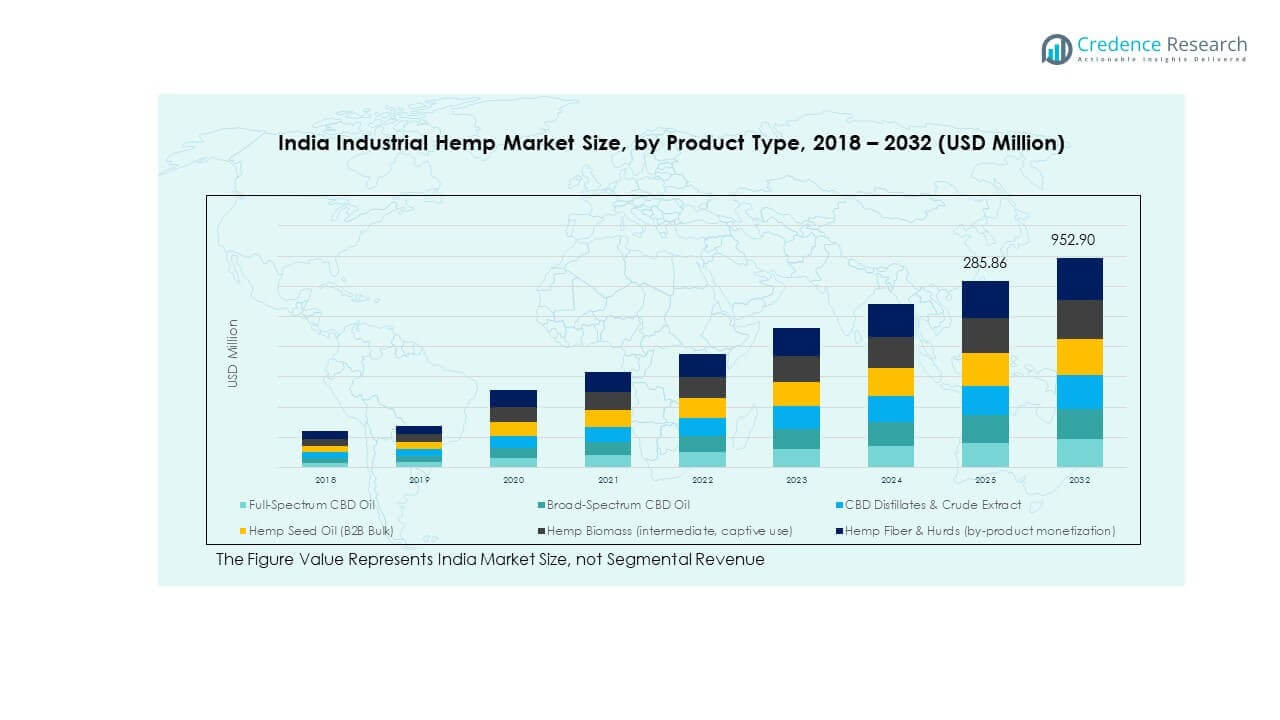Table of Content
Chapter No. 1 :………. Introduction.. 22
1.1. Report Description. 22
Purpose of the Report 22
USP & Key Offerings. 22
1.2. Key Benefits for Stakeholders. 23
1.3. Target Audience. 23
Chapter No. 2 :………. Executive Summary. 24
Chapter No. 3 :………. India Industrial Hemp Market – B2B Full-Spectrum CBD FORCES & INDUSTRY PULSE. 26
3.1. Foundations of Change – Market Overview.. 26
3.2. Catalysts of Expansion – Key Market Drivers. 28
3.2.1. Momentum Boosters – Growth Triggers. 29
3.2.2. Innovation Fuel – Disruptive Technologies. 29
3.3. Headwinds & Crosswinds – Market Restraints. 30
3.3.1. Regulatory Tides – Compliance Challenges. 31
3.3.2. Economic Frictions – Inflationary Pressures. 31
3.4. Untapped Horizons – Growth Potential & Opportunities and Strategic Navigation – Industry Frameworks. 32
3.5. Market Equilibrium – Porter’s Five Forces. 33
3.6. Ecosystem Dynamics – Value Chain Integration Analysis. 35
3.7. Macro Forces – PESTEL Breakdown. 37
3.8. Price Trend Analysis. 38
3.9. Price Trend by Product Type. 39
3.10. Buying Criteria 40
Chapter No. 4 :………. COMPETITION ANALYSIS. 41
4.1. Company Market Share Analysis. 41
4.1.1. India Industrial Hemp Market – B2B Full-Spectrum CBD Company Volume Market Share 41
4.1.2. India Industrial Hemp Market – B2B Full-Spectrum CBD Company Revenue Market Share 43
4.2. Strategic Developments. 45
4.2.1. Acquisitions & Mergers. 45
4.2.2. New Product Launch. 46
4.2.3. Agreements & Collaborations. 47
4.3. Competitive Dashboard. 48
4.4. Company Assessment Metrics, 2024. 49
Chapter No. 5 :………. India Market Analysis, Insights & Forecast, by Product Type. 50
Chapter No. 6 :………. India Market Analysis, Insights & Forecast, by Value Chain Integration.. 55
Chapter No. 7 :………. India Market Analysis, Insights & Forecast, by End-Use Application (B2B) 62
Chapter No. 8 :………. India Market Analysis, Insights & Forecast, by Business Model. 70
Chapter No. 9 :………. India Market Analysis, Insights & Forecast, by Compliance & Quality Grade. 75
Chapter No. 10 :…….. India Market Analysis, Insights & Forecast, by Geography. 80
Chapter No. 11 :…….. Company Profile. 85
11.1. BOHECO (Bombay Hemp Company) 85
11.2. HempStreet 88
11.3. Vedi Herbals 88
11.4. Atrimed Biotech. 88
11.5. India Hemp Organics. 88
11.6. HempCann Solutions. 88
11.7. Cannazo India 88
11.8. Satliva 88
11.9. CannaMeds India. 88
11.10. Avesthagen / Hemp Division. 88
List of Figures
FIG NO. 1………. India Industrial Hemp Market – B2B Full-Spectrum CBD Revenue Share, By Product Type, 2024 & 2032. 50
FIG NO. 2………. Market Attractiveness Analysis, By Product Type. 51
FIG NO. 3………. Incremental Revenue Growth Opportunity by Product Type, 2024 – 2032. 52
FIG NO. 4………. India Industrial Hemp Market – B2B Full-Spectrum CBD Revenue Share, By Value Chain Integration, 2024 & 2032. 55
FIG NO. 5………. Incremental Revenue Growth Opportunity by Value Chain Integration, 2024 – 2032. 56
FIG NO. 6………. Incremental Revenue Growth Opportunity by Value Chain Integration, 2024 – 2032. 57
FIG NO. 7………. India Industrial Hemp Market – B2B Full-Spectrum CBD Revenue Share, By End-Use Application (B2B), 2024 & 2032. 62
FIG NO. 8………. Market Attractiveness Analysis, By End-Use Application (B2B) 63
FIG NO. 9………. Incremental Revenue Growth Opportunity by End-Use Application (B2B), 2024 – 2032. 65
FIG NO. 10…….. India Industrial Hemp Market – B2B Full-Spectrum CBD Revenue Share, By Business Model, 2024 & 2032. 70
FIG NO. 11…….. Market Attractiveness Analysis, By Business Model 71
FIG NO. 12…….. Incremental Revenue Growth Opportunity by Business Model, 2024 – 2032. 72
FIG NO. 13…….. India Industrial Hemp Market – B2B Full-Spectrum CBD Revenue Share, By Compliance & Quality Grade, 2024 & 2032. 75
FIG NO. 14…….. Market Attractiveness Analysis, By Compliance & Quality Grade. 76
FIG NO. 15…….. Incremental Revenue Growth Opportunity by Compliance & Quality Grade, 2024 – 2032. 77
FIG NO. 16…….. India Industrial Hemp Market – B2B Full-Spectrum CBD Revenue Share, By Geography, 2024 & 2032. 80
FIG NO. 17…….. Market Attractiveness Analysis, By Geography. 81
FIG NO. 18…….. Incremental Revenue Growth Opportunity by Geography, 2024 – 2032. 82
List of Tables
TABLE NO. 1. :… India Industrial Hemp Market – B2B Full-Spectrum CBD Revenue, By Product Type, 2018 – 2024 (USD Million) 53
TABLE NO. 2. :… India Industrial Hemp Market – B2B Full-Spectrum CBD Revenue, By Product Type, 2025 – 2032 (USD Million) 53
TABLE NO. 3. :… India Industrial Hemp Market – B2B Full-Spectrum CBD Volume, By Product Type, 2018 – 2024 (Metric Tons) 54
TABLE NO. 4. :… India Industrial Hemp Market – B2B Full-Spectrum CBD Volume, By Product Type, 2025 – 2032 (Metric Tons) 54
TABLE NO. 5. :… India Industrial Hemp Market – B2B Full-Spectrum CBD Revenue, By Value Chain Integration, 2018 – 2024 (USD Million) 58
TABLE NO. 6. :… India Industrial Hemp Market – B2B Full-Spectrum CBD Revenue, By Value Chain Integration, 2025 – 2032 (USD Million) 59
TABLE NO. 7. :… India Industrial Hemp Market – B2B Full-Spectrum CBD Volume, By Value Chain Integration, 2018 – 2024 (Metric Tons) 60
TABLE NO. 8. :… India Industrial Hemp Market – B2B Full-Spectrum CBD Volume, By Value Chain Integration, 2025 – 2032 (Metric Tons) 61
TABLE NO. 9. :… India Industrial Hemp Market – B2B Full-Spectrum CBD Revenue, By End-Use Application (B2B), 2018 – 2024 (USD Million) 66
TABLE NO. 10. :.. India Industrial Hemp Market – B2B Full-Spectrum CBD Revenue, By End-Use Application (B2B), 2025 – 2032 (USD Million) 66
TABLE NO. 11. :.. India Industrial Hemp Market – B2B Full-Spectrum CBD Volume, By End-Use Application (B2B), 2018 – 2024 (Metric Tons) 68
TABLE NO. 12. :.. India Industrial Hemp Market – B2B Full-Spectrum CBD Volume, By End-Use Application (B2B), 2025 – 2032 (Metric Tons) 68
TABLE NO. 13. :.. India Industrial Hemp Market – B2B Full-Spectrum CBD Revenue, By Business Model, 2018 – 2024 (USD Million) 73
TABLE NO. 14. :.. India Industrial Hemp Market – B2B Full-Spectrum CBD Revenue, By Business Model, 2025 – 2032 (USD Million) 73
TABLE NO. 15. :.. India Industrial Hemp Market – B2B Full-Spectrum CBD Volume, By Business Model, 2018 – 2024 (Metric Tons) 74
TABLE NO. 16. :.. India Industrial Hemp Market – B2B Full-Spectrum CBD Volume, By Business Model, 2025 – 2032 (Metric Tons) 74
TABLE NO. 17. :.. India Industrial Hemp Market – B2B Full-Spectrum CBD Revenue, By Compliance & Quality Grade, 2018 – 2024 (USD Million) 78
TABLE NO. 18. :.. India Industrial Hemp Market – B2B Full-Spectrum CBD Revenue, By Compliance & Quality Grade, 2025 – 2032 (USD Million) 78
TABLE NO. 19. :.. India Industrial Hemp Market – B2B Full-Spectrum CBD Volume, By Compliance & Quality Grade, 2018 – 2024 (Metric Tons) 79
TABLE NO. 20. :.. India Industrial Hemp Market – B2B Full-Spectrum CBD Volume, By Compliance & Quality Grade, 2025 – 2032 (Metric Tons) 79
TABLE NO. 21. :.. India Industrial Hemp Market – B2B Full-Spectrum CBD Revenue, By Geography, 2018 – 2024 (USD Million) 83
TABLE NO. 22. :.. India Industrial Hemp Market – B2B Full-Spectrum CBD Revenue, By Geography, 2025 – 2032 (USD Million) 83
TABLE NO. 23. :.. India Industrial Hemp Market – B2B Full-Spectrum CBD Volume, By Geography, 2018 – 2024 (Metric Tons) 84
TABLE NO. 24. :.. India Industrial Hemp Market – B2B Full-Spectrum CBD Volume, By Geography, 2025 – 2032 (Metric Tons) 84






